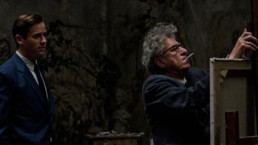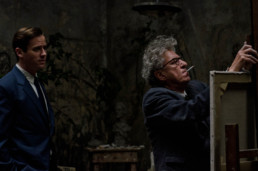‘Final Portrait’ Review: An Eccentric Artist is Crippled From Creating
Geoffrey Rush plays real-life artist Alberto Giacometti with temperamental flourishes.
Portraits of artists as tortured souls are generally funny for their self-imposed silliness.
However, in today’s multi-cultural landscape in which the voices of a wide variety of people of color, gender, and oppression are finally having their stories told, the stories of artists – almost all (white) men – are slowly gathering louder sighs and more pronounced eye rolls.
Now, if you have the appetite for it, this idea can still be a very funny thing, as the stubbornness of an artist is still the same silliness as in all egotistical people. Certainly, this conceit is something that the brilliant Phantom Thread (my second favorite film of last year) executed exactly right. Showing Daniel Day-Lewis’ couture dressmaker Reynolds Woodcock as a man who could only create his art when having breakfast totally undisturbed of toast-scraping, it flips this script on its head when it shows the utter absurdity of how fragile and irritable he is, should that sort of joke bemuse you.
The fragile and eccentric artist who is crippled from creating is also the story of Final Portrait, the debut feature film by Stanley Tucci. In Final Portrait, Tucci is similarly interested in the inner-workings of the manic mind of the tortured artist, of which the same temperament and unpredictability creates the greatest of masterpieces as well as stifles the creation of art. This study is found in the real-life story of a socialite – James Lord (Armie Hammer) – who agrees to sit for a portrait to be done by the legendary Swiss artist Alberto Giacometti (Geoffrey Rush). The joke of the movie – which also hinders the film’s pacing – is that what was estimated to be an afternoon’s worth of sitting ends up turning into days, which turns into weeks, of Lord waiting for Giacometti to do more than a few brush strokes at a time, or glob over days of work and re-start.
Tucci is similarly interested in the inner-workings of the manic mind of the tortured artist, of which the same temperament and unpredictability creates the greatest of masterpieces as well as stifles the creation of art.
One learns quickly that art isn’t in the final product, but in the process. Or at least one learns that’s what Tucci is interested in. As James Lord tells it – in sporadic voiceover narration that resembles a fascination to the mysterious mythological man like Nick in The Great Gatsby – he arrives at Giacometti’s studio day after day, only to join the artist on his tangents of frustration or going out to get drinks and women (Lord doesn’t partake, it’s hinted that he’s already spoken for by a man back home).
Hammer is polished and handsome but plays a toothless version of what his Winklevoss character might have been had he been entirely prep-school than bully. He does lend a soft and selfless performance, allowing Geoffrey Rush to own the movie as a chain-smoking and wild-mannered artist. Rush, even though his performance is all bravado and a hard act to maintain from start to finish, is captivating.
Ultimately, Final Portrait is just like its story of a temperamental and exacting artist. Tucci’s writer/director debut is a noble journey of exploration that, after all of the time that was put into it, is unfortunately unfruitful.
90 minutes. Final Portrait is rated R for language, some sexual references, and nudity. Now playing at select Laemmle Theaters.
Ryan Rojas
Ryan is the editorial manager of Cinemacy, which he co-runs with his older sister, Morgan. Ryan is a member of the Hollywood Critics Association. Ryan's favorite films include 2001: A Space Odyssey, The Social Network, and The Master.


